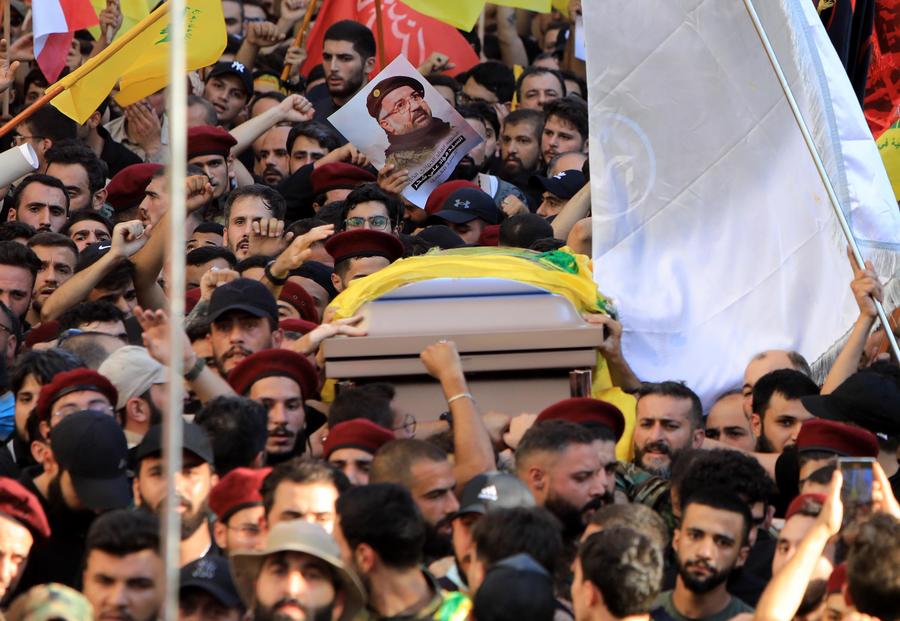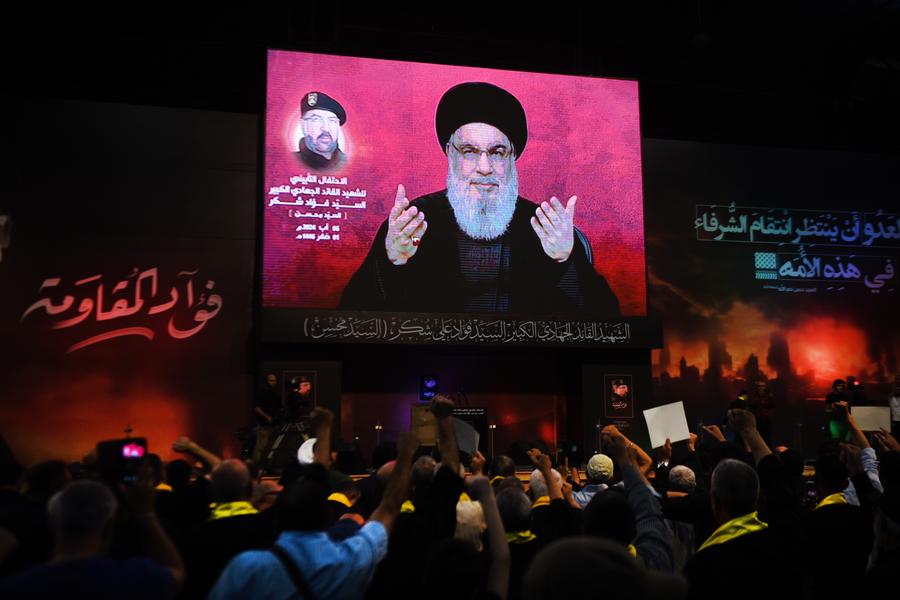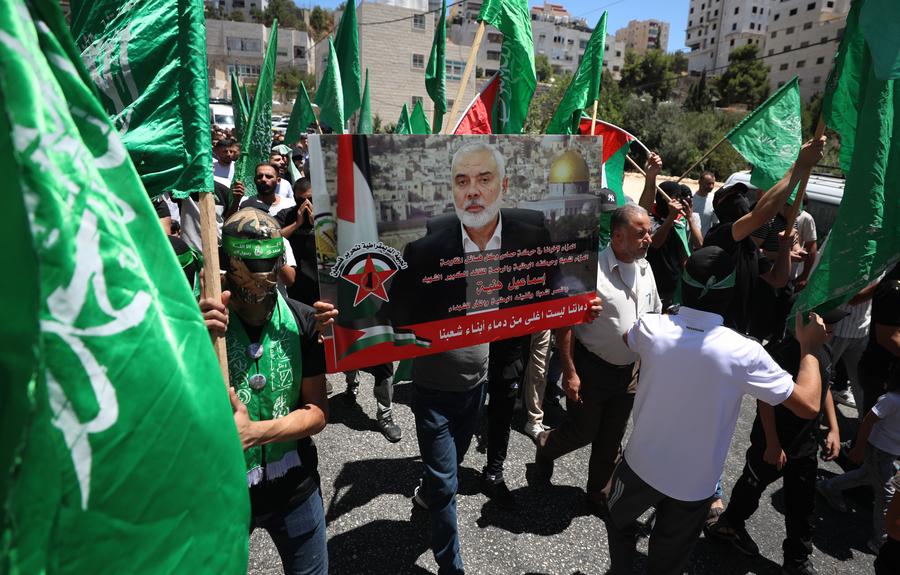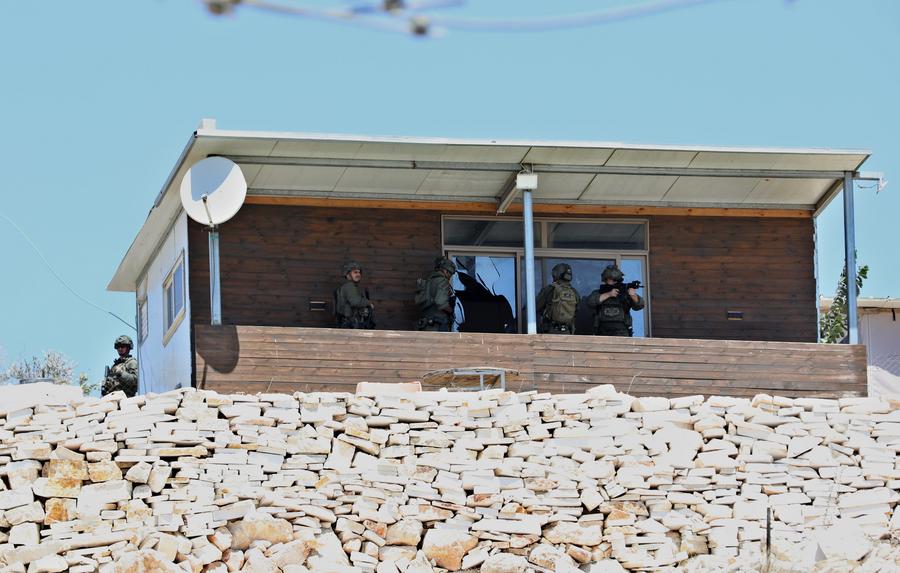Mideast tension heightening amid looming Iranian retaliatory attack on Israel
* The Middle East has been bracing for escalating tension amidst Iran and its allies' threats to avenge the killings of Hamas and Hezbollah leaders last week.
* Experts believed that a potential escalation of tension would severely undermine previous efforts to promote regional peace, dampen the chances of a ceasefire in Gaza, and plunge the Middle East into a real danger of a full-scale conflict.
* Nobody is interested in a regional war, and nobody is going to gain anything from a regional war, experts said.
CAIRO, Aug. 8 (Xinhua) -- The Middle East has been bracing for escalating tension amidst Iran and its allies' threats to avenge the killings of Hamas and Hezbollah leaders last week.
While Israel and its Western allies are on high alert for the retaliatory attacks they deem imminent, the fear for a spillover of the Gaza conflict has prompted many countries within the region and beyond to cancel flights and update travel advice concerning those countries in the whirlpool of regional tensions.
Experts believed that a potential escalation of tension would severely undermine previous efforts to promote regional peace, dampen the chances of an immediate and permanent ceasefire in Gaza, and plunge the Middle East into a real danger of a full-scale conflict.
The relevant parties should stop any provocative actions and work together for de-escalation, so as to pull the region back from the brink, they suggested.

Supporters attend the funeral of Fouad Shokor in Beirut, Lebanon, Aug. 1, 2024. (Xinhua/Bilal Jawich)
LOOMING REGIONAL ESCALATION
On July 30, Hezbollah senior military commander Fouad Shokor was killed in an attack on Beirut's southern suburbs.
A day later, Hamas Politburo chief Ismail Haniyeh, who was in the Iranian capital of Tehran to attend the inauguration of Iran's President Masoud Pezeshkian, was killed alongside his bodyguard when their residence was struck.
Israel has claimed responsibility for the killing of Shokor, but has not commented on the assassination of Haniyeh, which Hamas and Iran have attributed to Israel.
Right after the killing of Haniyeh, Iran's Supreme Leader Ali Khamenei vowed a "harsh punishment" for Israel. Earlier this week, Iranian Foreign Ministry spokesman Nasser Kanaani vowed to take serious and deterrent action against Israel with "strength and decisiveness," and rejected calls for negotiation. President Pezeshkian also said Israel would definitely receive the response to its "crime and insolent" move.
As for the death of Shokor, Hezbollah Leader Sayyed Hassan Nasrallah on Tuesday vowed an "impactful and strong" retaliation. "We may choose to retaliate in cooperation with other resistance powers in Iran and Yemen or separately."
"The war has entered a new phase," Nasrallah said earlier, adding that the upcoming campaign will involve Iran, Yemen and Iraq, in addition to Gaza and Lebanon.

Hezbollah supporters listen to a televised speech given by Hezbollah Leader Sayyed Hassan Nasrallah during an event commemorating late military commander Fouad Shokor in Beirut, Lebanon, Aug. 6, 2024. (Xinhua/Bilal Jawich)
On Aug. 1, Yemen's Houthi leader Abdul-Malik al-Houthi warned that the Houthi group will "inevitably" mount a military response to Israel's recent escalation.
For the expected retaliatory attack from Iran and its allies, Israeli Defense Minister Yoav Gallant said the Israeli forces were preparing for "a swift transition to offense." The Israel Defense Forces stated that Chief of the General Staff Herzi Halevi has approved "operational plans for various scenarios."
More American forces were moving to the region to bolster defenses in and around Israel. The United States was deploying additional warships, including a guided missile cruiser and missile destroyer, as well as another squadron of fighter jets, Israel's state-owned Kan TV news reported, adding that Britain is also expected to help protect Israel in case of an attack.
Tit-for-tat attacks between Israel and Hamas-backed armed groups remained intense and heavy following the death of Hamas and Hezbollah leaders. The Palestinian Health Ministry said at least eight Palestinians were killed in an Israeli airstrike on a vehicle carrying aid in central Gaza on Monday, and two more were killed and three others injured by the Israeli forces' bullets near the northern West Bank city of Jenin on Tuesday.

People take part in a protest against the assassination of Hamas Politburo Chief Ismail Haniyeh in the West Bank city of Hebron, July 31, 2024. (Photo by Mamoun Wazwaz/Xinhua)
Meanwhile, Israeli sources said a drone attack launched on Tuesday from Lebanon by Hezbollah forces injured six people in northern Israel, including one in critical condition.
Negativity has already seeped into various facets of people's lives in the Middle East due to the prolonged regional conflict. The war-torn Gaza and southern Lebanon have been in the throes of a deepening water and electricity crisis.
With the Palestinian death toll from ongoing Israeli attacks on the Gaza Strip nearing 40,000, the crossfire between relevant parties spreading from Gaza into the West Bank, and Iran and its allies' retaliation for Israel being touch and go, fears and anxiety among citizens of regional countries have mounted even more.
Sonic booms on Tuesday caused by Israeli warplanes breaking the sound barrier over Lebanon's capital of Beirut have prompted local residents to start packing and seek shelter in mountainous areas.

Israeli troops are seen during a military operation in Kafr Qud, near the West Bank city of Jenin, Aug. 6, 2024. (Photo by Ayman Nobani/Xinhua)
Concerning the deteriorating regional security situation, Türkiye, France, Germany, the Netherlands, Poland, Croatia, Slovenia, Norway and Sweden have all advised their citizens to leave Lebanon. Several French and Polish airlines have suspended flights to Lebanon.
Meanwhile, a growing number of airlines, including Ryanair, Wizz Air, Lufthansa, Easyjet and Air India, have suspended flights to Israel due to concerns over instability.
REGIONAL WAR BENEFITS NOBODY
Regarding the heightening tension in the Middle East, Eyal Zisser, vice rector of Tel Aviv University and an expert on Middle Eastern Affairs, said the Iranian attacks would be "limited" and are not intended to start a regional war.
"Nobody is interested in a regional war. Nobody is going to gain anything from a regional war," he said.
"But once you start with retaliation, and you retaliate to the retaliation, and so on and so forth, the result can be that you lose control, and we eventually can find ourselves in a regional war. But that's not what all parties want right now," he noted. "When you set up a fire, it's sometimes very difficult to keep the fire on a low level."
"Iran wants to respond to Israel's strikes, systematic assassinations, and the resumption of the assassination policy by Israel, but I think Iran does not want to expand the scope (of the conflict)," said Hamid Faris, a professor of international relations at Egypt's Misr University for Science and Technology.
Nimrod Goren, a senior fellow for Israeli affairs at the Washington-based Middle East Institute, said, "The fact that a regional war may be averted does not ensure that an Israel-Hezbollah flare-up will be prevented, and such an escalation will cause much damage in Israel and Lebanon, even without a regional war."
"Diplomatic efforts should be stepped up to find an off-ramp soon to the situation along the Israel-Lebanon border," he said.
Abdullah Mahmoud, a Cairo-based researcher in Iranian affairs of the Middle East Forum for Strategic Studies and National Security, said, "The attack this time will be a collaboration of attacks by different resistance movements."
"Hezbollah and Houthis will join the attack. I think there will be a high level of coordination among the resistance movements," he said.
Ten months after the outbreak of the Israeli-Palestinian conflict on Oct. 7, 2023, escalating tension shows no end in sight. The spiral of violence has deeply undermined confidence in achieving peace.
However, Goren believes "achieving peace is possible, but is a longer-term goal."
"In the short term, a ceasefire and hostage release deal should be brokered between Israel and Hamas, then leveraged for defusing tensions along the Israel-Lebanon border, advancing the two-state solution, and promoting Israel-Saudi Arabia normalization," he said.
Photos
Related Stories
- Chinese FM holds phone talks with Jordanian counterpart on Mideast situation
- China provides action plans for global development: experts
- U.S. blamed for being cause of chaos as Mideast tensions heat up
- Middle East countries condemn Moscow terror attack, voice solidarity with Russia
- One year after Saudi-Iranian reconciliation, China's dedication to peace still resonates in Middle East
- Security Council convenes to address Middle East tensions after U.S. military actions
- Explainer: Why does U.S. conduct "retaliatory strikes" in Middle East
Copyright © 2024 People's Daily Online. All Rights Reserved.









